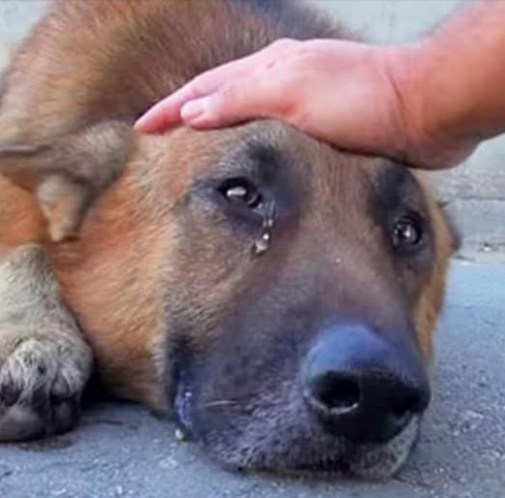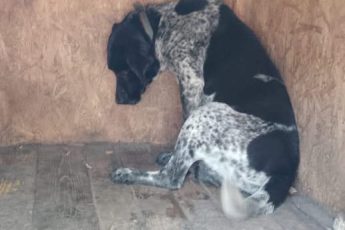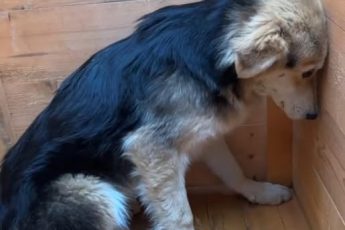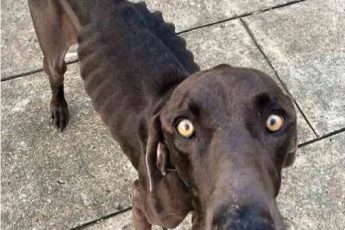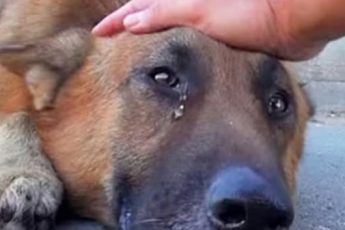When we arrived, he didn’t move.
He was lying on the concrete edge of an old, abandoned yard, as if someone had gently placed him there — and forgotten.
There was no need to catch him. He didn’t even try to run.
“Is he alive?” the volunteer asked.
I nodded. His heart was beating, but so faintly it was barely there.
He didn’t lift his head when I sat down beside him. He didn’t turn, didn’t flinch, didn’t shiver. He just breathed. Quietly. Barely audible.
I placed my hand gently on his forehead. Carefully, like you would with a child.
And then something happened that I didn’t expect:
a real tear rolled down the dog’s cheek.
I froze.
He didn’t blink. Didn’t move. Just lay there.
And cried.
We didn’t know his story. Only fragments.
Someone said he had been thrown out of a car a few weeks earlier.
Someone else said he had lived in a private yard until his owners disappeared.
But we knew one thing — he didn’t resist.
Because he had stopped expecting anything.
His first night at the shelter, he spent in a corner. Lying on the bare floor. Not even on a blanket.
On the second day, he wouldn’t touch his food.
On the third, he started drinking water.
And on the fifth day — he looked into our eyes for the first time.
Not just a glance. He looked deeply.
As if asking: is it worth believing again?
When we petted him, he didn’t wag his tail. He just blinked. Each touch felt like the first time.
Like a person who had only ever heard shouting — and suddenly heard: “you are good.”
A week passed. They named him simply — Tikhon. (which means “Quiet One” in Russian)
Because he didn’t bark. Didn’t whimper. He just existed.
Calm, like the silence inside a temple. Listening. Understanding.
And then one day, a man came to the shelter. Older, with a cane. In his hand — an old, crumpled photograph.
“I had a dog. He died a year ago. I thought I could never… But when I saw the photo of Tikhon, something squeezed in my chest.”
“Would you like to try?”
“I just want to sit beside him. If he’ll let me.”
They sat together for forty minutes.
No words. No movement.
Just the old man — and the dog resting his head on the man’s shoe.
It was enough.
From that day, Tikhon lived in a small house outside the city.
He didn’t play with balls, didn’t run loudly, didn’t bark at the window.
He was simply present.
Every evening, he came and lay beside his owner. Pressing lightly against his shoulder.
As quietly as he had done in the shelter.
But the story did not end there.
Sometimes the man would tell how Tikhon helped him get through the loneliness.
“He doesn’t need much. Just to be. Here. Next to me.”
And that — was more than enough.
One day, during a rainstorm, the elderly man slipped in the yard.
Tikhon didn’t get scared. Didn’t panic. He crawled over, offered his shoulder, and stayed close.
He helped. Simply. In his own way.
People often asked, why this dog?
And the old man would always answer the same way:
“Because he cried once. And now he lives. And that is enough.”
Because sometimes, one tear is enough to begin a new life.
And Tikhon proved that.
Winter arrived quietly. Snow fell slowly, as if it didn’t want to disturb. In Tikhon’s home, it was warm. The old man knitted a sweater, and Tikhon lay curled up by the stove. His fur had grown thicker and darker. His gaze — steady, calm.
He no longer hid his face when touched. No longer flinched at sudden noises. He didn’t need words — his presence alone said: “I am home.”
Every Sunday, they had tea together. One — from a cup, the other — from a bowl with warm honey water. The old man read the newspaper, sometimes aloud, sometimes to himself. And Tikhon lay beside him.
“You know, boy, you listen better than anyone…”
One day, children came into the yard, playing and laughing. One boy was afraid of dogs. But Tikhon didn’t move. He lay there, just watching. Blinking slowly.
The boy approached. Carefully. Held out his hand.
Tikhon licked it — once.
Everyone saw that moment. And no one was afraid anymore.
“He’s special,” the neighbor would say. “He’s not just a dog. He’s healing.”
When it got dark outside, the old man would leave the door slightly open. Because Tikhon liked to look at the stars before sleeping.
Sometimes it seemed like he was remembering someone. Maybe that night on the concrete. Maybe himself, from before.
But whatever it was — he was no longer alone.
And it seems that was the most important thing.
Because sometimes, you don’t need noise. You don’t need words. It is enough — just to be.
Like Tikhon.
A story that began with a tear — became a home.
